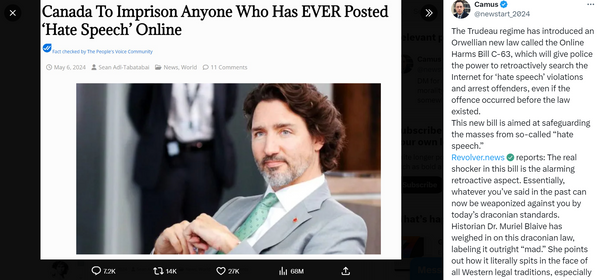Canada's Justin Trudeau Accused of Introducing Law To Imprison Anyone Who Ever Posted Hate Speech. We Looked Into It

On May 7, 2024, an X user claimed Canadian Prime Minister Justin Trudeau's government had introduced a new "Orwellian" law called the Online Harms Bill C-63 that would allow police to arrest people for posting hate speech online, even if the offense took place before the legislation existed.
The user wrote:
The Trudeau regime has introduced an Orwellian new law called the Online Harms Bill C-63, which will give police the power to retroactively search the Internet for "hate speech" violations and arrest offenders, even if the offence occurred before the law existed. This new bill is aimed at safeguarding the masses from so-called "hate speech."

(X account @newstart_2024)
The post referenced articles by two conservative news outlets, Revolver News and The People's Voice, that also discussed the claim.
Similar posts appeared all over X, where one user declared: "WTF." The platform's owner, Elon Musk, added: "This sounds insane if accurate!"

(X account @elonmusk)
Examples also emerged on Facebook, while Musk's and the original X user's posts had amassed more than 140 millions views combined, at the time of this writing.
Snopes looked into the legislation to see whether there was any evidence police would have the power to retroactively arrest people for posting hate speech prior to the bill's implementation.
What Do We Know About the Bill?
Canada's ruling Liberal Party unveiled proposed legislation called Bill C-63 on Feb. 26, 2024.
A government media release said the bill would create an Online Harms Act that would "hold social media platforms accountable for addressing harmful content on their platforms and for creating a safer online space that protects all people in Canada, especially kids … and better safeguard everyone in Canada from online hate."
The proposals specifically target seven types of harmful content:
Content that sexually victimizes a child or revictimizes a survivor.
Intimate content communicated without consent.
Content used to bully a child.
Content that induces a child to harm themself.
Content that foments hatred.
Content that incites violence.
Content that incites violent extremism or terrorism.
Under the act, social media companies would be subject to three duties: acting responsibly, protecting children, and making certain content inaccessible — such as content that sexually victimizes a child or revictimizes a survivor, or intimate images posted without consent
The legislation would also establish a Digital Safety Commission, which would oversee and enforce new regulations on hate speech and the protection of children, and a digital safety ombudsperson, who "would act as a resource and advocate for users and victims." Both would be supported by a Digital Safety Office.
Importantly, the media release showed it would be the commission that enforces the laws, not the police.
In addition, Bill C-63 — which was not legally enforceable at the time of this writing as it had not yet received royal assent, the monarch's formal approval of legislation — proposed changes to Canada's Criminal Code and the Canadian Human Rights Act that would "better combat hate speech and hate crimes, provide improved remedies for victims and hold individuals accountable for the hatred they spread."
It would also increase the maximum sentences for illegal hate speech and allow Canadians to report such incidents to a human-rights tribunal. If successful, victims could be compensated up to CA$20,000, and fines of up to CA$50,000 could be levied.
What Is Unclear in the Bill?
Snopes found no evidence in Bill C-63 to support the claim the police would have the power to arrest someone if they found that person had posted hate speech online before the legislation's implementation.
However, text in section 41 of the bill, which listed proposed amendments to the CHRA, was somewhat unclear. It said if the person or panel conducting a Digital Safety Commission inquiry into discriminatory practice, such as hate speech, upholds a complaint, they may order the accused to pay a penalty of up to CA$50,000 to the government if the member or panel considers it appropriate with regard to:
The nature, circumstances, extent and gravity of the discriminatory practice.
The wilfulness or intent of that person.
Any prior discriminatory practices that the accused has engaged in.
The accused's ability to pay the penalty.
The proposed bill did not define whether "prior discriminatory practices" would include offenses that took place before the legislation was implemented. However, the clause about "prior discriminatory practices" appeared to be relevant only if someone had a new complaint filed against them.
Snopes contacted the Canadian government for clarity on this and numerous other matters relating to the Bill and will update this article if we receive a response.
Another fact-checking outlet also addressed the claims about retroactive punishments for hate speech, finding that the focus was on continuous hate speech.
Bill C-63 is available in full below:
https://media.snopes.com/2024/05/canadian_online_harms_bill_c-63.pdf
(House of Commons Canada)
What Did the Bill's Opponents Say?
Some individuals and civil-rights groups condemned the legislation, branding it an attack on free speech.
Snopes spoke to the Canadian Civil Liberties Association, which opposes the bill in its current form, and asked whether the legislation would allow the police to imprison anyone who has ever posted hate speech online.
The group said any such claims were inaccurate. Anaïs Bussières McNicoll, director of the CCLA's Fundamental Freedoms Program, told Snopes:
The general rule under Canadian law is that statutes are not to be construed as having retroactive effect unless such a construction is expressly or by necessary implication required by the language of the law. Part 2 of Bill C-63 does propose some amendments to the Criminal Code with respect to hate crimes, but nothing indicates that these amendments would have a retroactive effect.
However, McNicoll explained that a different part of the bill would amend the Canadian Human Rights Act further as to which hate speech communicated online would be considered "discriminatory." She said the text in part 3 of section 34 "is not clear."
One can read it as implying a retroactive effect, although that is not explicitly mentioned. In any event, that section does not relate to criminal proceedings, but human rights legislation.
McNicoll concluded by saying the CCLA did not believe the amendments being considered under the bill should be enforced retroactively if it is granted royal assent.
Sources:
Government Bill (House of Commons) C-63 (44-1) - First Reading - An Act to Enact the Online Harms Act, to Amend the Criminal Code, the Canadian Human Rights Act and An Act Respecting the Mandatory Reporting of Internet Child Pornography by Persons Who Provide an Internet Service and to Make Consequential and Related Amendments to Other Acts - Parliament of Canada. https://www.parl.ca/documentviewer/en/44-1/bill/C-63/first-reading. Accessed 14 May 2024.
Heritage, Canadian. Proposed Bill to Address Online Harms. 26 Feb. 2024, https://www.canada.ca/en/canadian-heritage/services/online-harms.html.
McNicoll, Anaïs Bussières. 'Online Harms Act (Bill C-63): CCLA Joins Civil Society Call to Separate Parts Two and Three from the Bill'. CCLA, 8 May 2024, https://ccla.org/criminal-justice/online-harms-act-bill-c-63-ccla-joins-civil-society-call-to-separate-parts-two-and-three-from-the-bill/.
Wong, Adrian, Dr. 'Will Bill C-63 jail those who ever posted hate speech online?!' TechARP. 8 May 2024, https://www.techarp.com/crime/bill-c-63-jail-hate-speech-online/. Accessed 14 May 2023.

 Yahoo Sports
Yahoo Sports 
